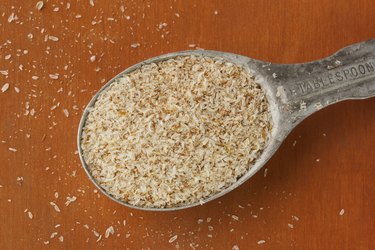
Psyllium is a natural source of fiber derived from the Plantago ovata plant, which has small, gel-coated seeds. This plant provides soluble fiber that forms a paste in your stomach. Psyllium husk side effects help slow digestion, promote steady blood sugar levels and make you feel fuller, longer.
According to the Cleveland Clinic, psyllium is sometimes used to help lower cholesterol and might improve heart health. However, taking too much psyllium husk can cause unpleasant symptoms. Speak to your physician before taking psyllium to ensure that you are taking the right dose for you.
Video of the Day
Video of the Day
Tip
Taking too much psyllium husk can lead to abdominal discomfort and other digestive issues. It can also interact with certain medications.
Medication Dangers of Psyllium Husk
One of the potential dangers of psyillium husk is medication interactions. Psyllium husk is intended to slow the passage of substances through your digestive tract. This effect can be harmful, however, if you are taking certain medications that rely on a specific digestion time to be effective.
According to the Mayo Clinic, fiber supplements, such as psyllium, can also interfere with the body's ability to absorb certain medications, such as aspirin and carbamazepine. They can affect blood sugar levels as well, which is significant for people who have diabetes.
Avoid Abdominal Discomfort
Although your body does not completely digest psyllium husk, you must become accustomed to the added amounts of fiber in your body.
If you increase your psyllium husk dosage too quickly or take too much psyllium at one time, you may experience gastrointestinal side effects, such as gas and bloating, because the bacteria in your intestines give off extra gas while trying to become accustomed to the added fiber.
If you don't drink enough fluids in addition to the psyllium you take, you also may experience constipation. This is because soluble fiber must soak up water to be effective. Without enough water, your stool can become hardened, dry and difficult to pass.
Beware of Severe Symptoms
In addition to uncomfortable symptoms like gas and bloating, you might also experience severe side effects as the result of taking too much psyllium husk.
Vomiting, severe stomach pain, rectal bleeding or constipation that lasts longer than seven days are potentially serious side effects of taking too much psyllium husk. If you experience these symptoms, talk to your physician immediately.
Recommended Psyllium Husk Dosage
To help prevent negative psyllium husk side effects, always drink at least 8 ounces of water with each dose, as advised by the U.S. National Library of Medicine.
Although you should always follow the advice of your health care provider concerning your psyllium dosage, beginning with a smaller dosage may help your body adjust to the added fiber.
Over time, you can increase your dosage to the recommended amount, dissolved in an 8-ounce cup of water. If you miss a dose, do not double up. This can increase your risk of unwanted side effects.
Warning
Do not take psyllium for more than one week unless otherwise instructed by your doctor.
Was this article helpful?
150 Characters Max
0/150
Thank you for sharing!
Thank you for your feedback!